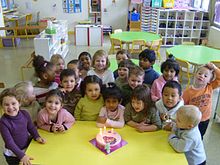oboli bavshvebi
Saturday, June 19, 2010
აქ მდებარეობს ობოლ ბავშვთა თავშესაფარი
Saturday, June 12, 2010
Tuesday, June 8, 2010
სოციალურად დაუცველი ბავშვები
Socialization of the child

All children go through stages of social development. An infant or very young child will play alone happily. If another child wanders onto the scene, he or she may be physically attacked or pushed out of the way. Next, the child is able to play with another child, gradually learning to share and takes turns. Eventually the group grows larger, to three or four children. By the time a child enters kindergarten, he or she is usually able to join in and enjoy group experiences.[6]
Children with ADHD and learning disabilities may need extra help in developing social skills. The impulsive characteristics of an ADHD child may lead to poor peer relationships. Children with poor attention spans may not tune in to social cues in their environment, making it difficult for them to learn social skills through experience.[6]
ობოლი ბავშვების სკოლა
A child (plural: children) is a young human; childhood is usually defined as the period between the stages of birth and puberty or adulthood. The legal definition of "child" generally refers to a minor, otherwise known as a person younger than the age of majority. "Child" may also describe a relationship with a parent or authority figure, or signify group membership in a clan, tribe, or religion; it can also signify being strongly affected by a specific time, place, or circumstance, as in "a child of nature" or "a child of the Sixties."[1]
სტატია ბავშვებზე
Construction of the child
Many children's literature critics now point out that children are not one group, but differ according to gender, ethnicity, religious background, and so on. Feminist children's literature critics such as Lissa Paul (1987) therefore try to work out how boys and girls read differently, for instance. Other critics (for instance, Peter Hunt (1991), Perry Nodelman (1992), John Stephens (1992), and Roderick McGillis (1996)) take this idea a step further and argue that children are often "colonized" by adults, including children's literature critics, because adults speak on behalf of children instead of letting children express themselves. However, these critics too can not agree on what then are "true" children expressing themselves, and which books are therefore "good" for them. Finally, a few critics, notably Jacqueline Rose (1984) and Karin Lesnik-Oberstein (1994 and 2004) take this discussion even further, arguing that identities are created and not "inherent", and that in the case of an identity such as "childhood" it is created by "adults" in the light of their own perceptions of themselves. That is, "adulthood" defines "childhood" in relation to differences and similarities it perceives to itself. This post-structuralist approach is similar to that argued by critics in gender studies such as Judith Butler and is widely accepted and used in sociological and anthropological studies of childhood (Jenks 1996; Jenks, James and Prout 1997).
